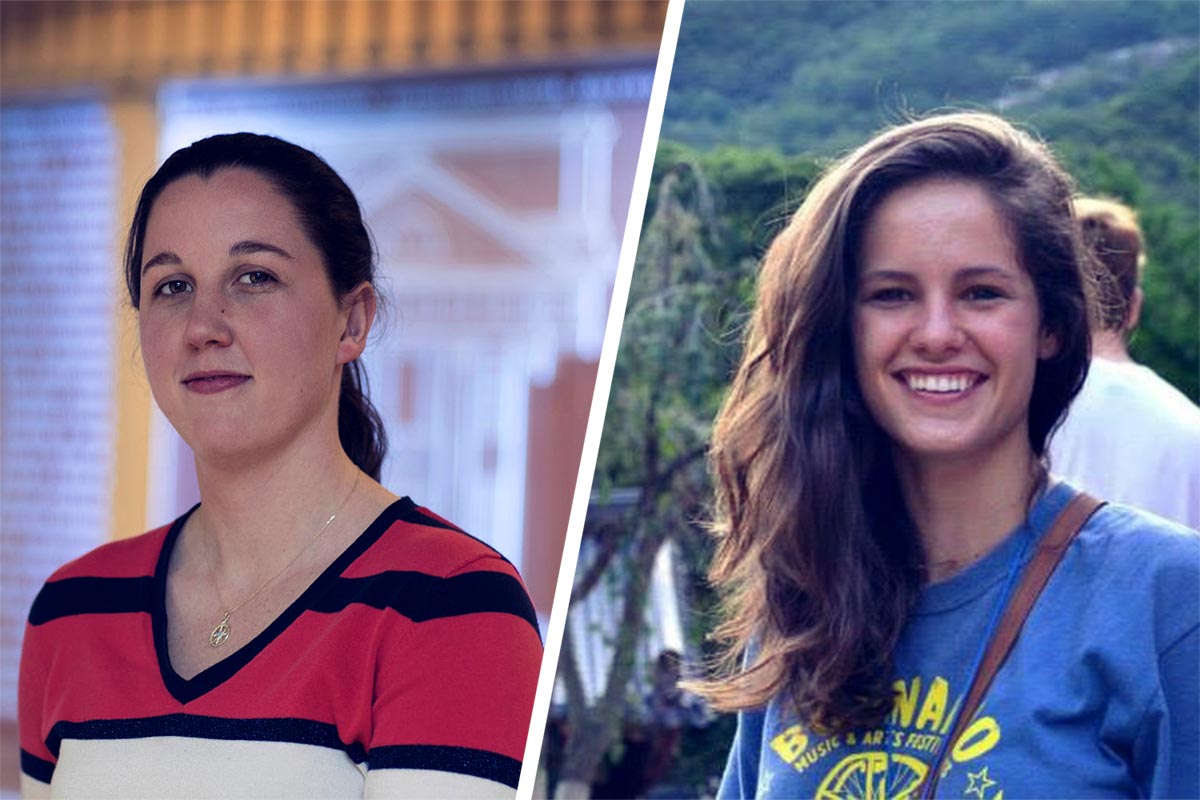Michaela Rikard and Courtney Hill – doctoral students in biomedical and civil engineering, respectively – have spent the past year working together to help make the University of Virginia a hub for graduate students seeking training and experiences in science policy.
To develop their Science Policy Initiative, they have procured more than $13,000 from the Office of Graduate and Postdoctoral Affairs and the Jefferson Scholars Foundation.
Last month, they held a science policy symposium that drew more than 100 attendees from across Grounds and elsewhere, representing 31 UVA departments and centers and more than 10 universities and corporations. The student-organized event brought in science policy experts from the National Institutes of Health, the National Science Foundation, the American Association for the Advancement of Science, the White House Office of Science and Technology Policy, and more.
Recently, Schmidt Sciences awarded the Science Policy Initiative a $100,000 grant to expand efforts in preparing STEM graduate students for science policy careers, and to strengthen the national network of student organizations devoted to science policy.
Additionally, the group will hold a science policy boot camp for UVA students Jan. 8 through 12.
“Our society is in desperate need of highly trained experts with a deep understanding of research in many decision-making contexts,” said Phillip Trella, assistant vice president of graduate and postdoctoral affairs. “The members of the Science Policy Initiative are yielding fantastic results, highlighting the demand among graduate students for a broader array of training opportunities. They are building capacity for UVA to become a national leader in the preparation of versatile graduate students and postdoctoral fellows, capable of succeeding in many environments.”

Engineering doctoral students Michaela Rikard, left, and Courtney Hill have been working to make UVA a national hub for grad students seeking training and experiences in science policy. (Photos by Dan Addison, University Communications)
UVA Today recently contacted Rikard and Hill to discuss their initiative.
Q. What is your goal for the Science Policy Initiative?
Hill: The Science Policy Initiative at UVA is a student organization empowering scientists and engineers to be more informed and involved in science policy. This includes enhancing awareness among graduate and post-doctoral students in engineering and science disciplines about fellowship and career opportunities in science policy, advocating to the University administration for support of graduate students pursuing policy careers, and facilitating community outreach events to increase awareness and understanding of scientific research.
Q. Why do we need this initiative now?
Rikard: It is evident now, more than ever, that there is a critical need for scientists and engineers to inform and evaluate policy that regulates national research interests, scientific research budgets and technology policy.
Currently, the majority of academic institutions excel only at training students for academic positions, but fail to convey the breadth of career opportunities available to scientists and engineers and provide even less professional development in these areas. Students are either unaware that there are well-established pathways to work in science policy, are discouraged to pursue these pathways by their institution, or don’t feel that they have the necessary skills and qualifications.
It is our goal to make students aware that these opportunities are widespread, that these career pathways are immensely valuable to society, and provide them with the training necessary to be successful in these positions.
Q. Are there career possibilities in science policy for Ph.D. graduates from non-policy disciplines?
Hill: Yes, but many science and engineering graduate students are unaware that they exist. Science-policy fellowships are offered through many professional societies, including the American Chemical Society and the American Institute of Physics. In all likelihood, a fellowship exists in an area that suits you. AAAS Science Policy Fellowships provide scientists and engineers of all stripes the opportunity to work either in Congress or one of the many science agencies in Washington, D.C.
The national academies of Science, Engineering, and Medicine offer the Christine Mirzayan Science and Technology Policy Internship to engage graduate students in the analysis and creation of science and technology policy. These are only a handful of the many well-established fellowship and internship opportunities for engineering and science graduate students to get experience working in science policy.
Q. Even if a science major or Ph.D. student has no intention of working in policy, what can she or he gain by joining your group?
Rikard: It may seem that the world of scientific research could not be more different than that of policymakers in D.C. However, these two have strong ties, and it is important for those who want to pursue academia or industry positions to understand how they affect one another. Students who do not intend to work in policy will learn more about this relationship and how to relay the importance of their research to policymakers and broader audiences as a whole.
Q. Courtney, you recently won a fellowship to work on science policy issues as a Christine Mirzayan Fellow, allowing you to work on science policy issues at the National Academy of Sciences for three months early next year. What will that encompass?
Hill: Through the Mirzayan fellowship, I will spend three months with the InterAcademy Partnership, a unit that works to produce evidence-based statements and reports examining major priorities for sustainable development, and to provide independent and authoritative advice to national governments and inter-governmental organizations, including the United Nations, on critical science-based issues.
I will be assigned to a senior staff mentor and work on a variety of projects to get exposure to the unit. During the first week of the fellowship program, I will join a cohort of fellows learning about how the [national academies] operate and gaining an understanding of the fundamentals of science and technology policy. We will receive briefings from representatives of other organizations in Washington, D.C. that influence, make, or report on science and technology policy.
Q. Please tell about your upcoming boot camp. What will it cover? How can people register?
Rikard: We are partnering with UVA’s Office of Graduate and Postdoctoral Affairs to offer the first-ever UVA Science Policy boot camp for graduate students and postdocs. Taking place this Jan. 8 to 12 ( from 9 a.m. to noon each day) in Nau Hall, the boot camp is intended to offer those interested in careers in science and technology with a basic familiarity in science policymaking.
Led by [UVA Office of the Vice President for Research administrator] Joel Baumgart , a former AAAS Science and Technology Policy Fellow and National Academies Mirzayan Fellow, the program will cover some of the history of science policy in the U.S. and will explicate the public policy behind – and the government’s role in – the science and technology ecosystem. Participants will also learn about a variety of fellowship opportunities in the area of science policy, and how best to position themselves for such opportunities.
Students who are interested in registering for the course can contact the Office of Graduate and Postdoctoral Affairs. Visit spiatuva.org to connect with the Science Policy Initiative at UVA.
Media Contact
Article Information
January 2, 2018
/content/qa-stem-grad-students-seeking-push-knowledge-beyond-academia

